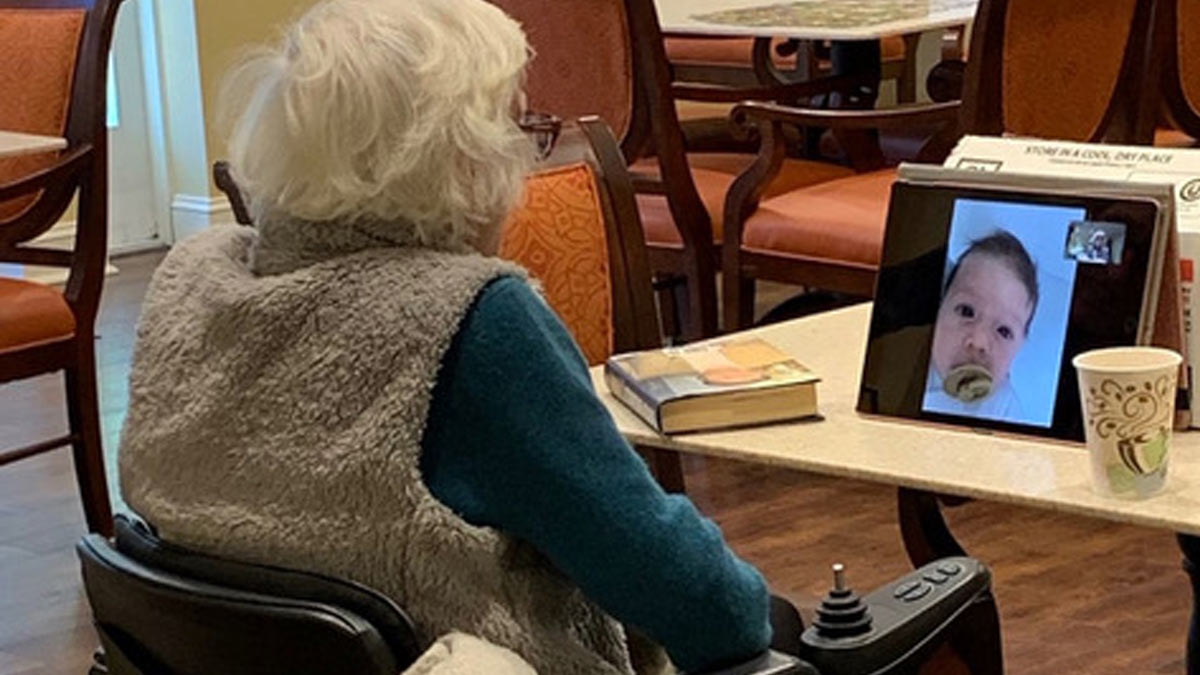Mason Alexander and his wife Frances spend each and every day together – sharing breakfasts, taking short walks, chatting about family and friends, holding hands, watching TV. They have lived at the Bishop Gadsden Episcopal Retirement Community on James Island, near Charleston, since 2004.
But they haven’t lived together since January. Mason resides in the assisted living section of the sprawling campus; his wife, Frances, is in skilled nursing care. Still, every day, Mason makes his way across campus to spend the day with Frances. Sixty-one years married, the Alexanders are unwilling – unable – to be kept apart, even for a day. At least until the COVID-19 pandemic required administrators at the facility to institute strict quarantining of residents and enforce social distancing.
Perhaps one of the hardest parts of coping with this pandemic has been the sense of aloneness and separation felt by families and friends. In a facility like Bishop Gadsden, which prides itself on nurturing a sense of community and shared experience, combatting that malaise was critically important.
A “life plan community,” Bishop Gadsden has residents ranging from wholly self-sufficient seniors through assisted living, skilled nursing and memory care. The staff of 400 full- and part-time team members includes nurses, a physician, health aides, cooks, operational staff, social workers, housekeepers, gardeners and more.
The facility occupies 100 unspoiled acres on James Island, part of a cluster of barrier islands protecting the historic city of Charleston, just 10 minutes away. Because of its location, administrators such as CEO Sarah Tipton and Kimberly Borts in communications are used to dealing with emergencies – specifically hurricanes. They are “always challenging, but we come out of them learning so much,” said Borts, noting “this is like a marathon hurricane. We don’t know when it’s going to leave.”
The Bishop Gadsden management was already in precautionary mode in February because of a number of flu cases. By March 3, even though there were no COVID-19 cases in the state, “we had really started to clamp down.”
Personal Protective Equipment such as face masks, face shields, gloves and gowns were amassed early on as a flu response. The campus also has its own outpatient clinic – staffed by a physician and nurse practitioner – and a pharmacy.
“The need for information is constant when you are separated from your family for whatever reason,” Tipton said.
Bishop Gadsden staff responded to the need with daily communications to residents with information about shopping, best practices for personal protection and daily ideas for virtual activities like online tours of Charleston and links to international performances of opera and dance.
The communications have also kept residents up to date on COVID-19 testing and infections on campus. To date, there have been two positives among residents and both have recovered.
“The more we can say, the more we can tell them, the better,” Tipton explained. “We’re being as transparent and as completely honest about everything that we can be. That builds a lot of trust. That’s one reason that these restrictions aren’t met with a lot of resistance.”
But the greatest challenge, and opportunity, is in the social and emotional well-being of residents – and for that they’ve turned to technology, one of the most interesting side effects of the pandemic, Tipton believes.
“The tech divide is quickly falling by the wayside,” she pointed out.
The facility has an IT team that helps connect residents and their families, providing tech support and equipment to bring people together for face-to-face chats or online happy hours.
It’s a virtual connection that has enabled Mason and Frances to continue to see each other several times each day despite COVID-19.
“The video chatting has been wonderful,” Mason said. “My vision is such that I think of her the way she was 60 years ago when her face appears. I can’t say enough for the efforts of the staff to do this for us. It’s hard when you have been with someone for 61 years and you can’t see them anymore.”
“So much is outside of our control,” Borts admitted. “But we can try to do everything we can to make the environment here as stimulating and interesting as possible for all of our residents.”
By Laura Haight







